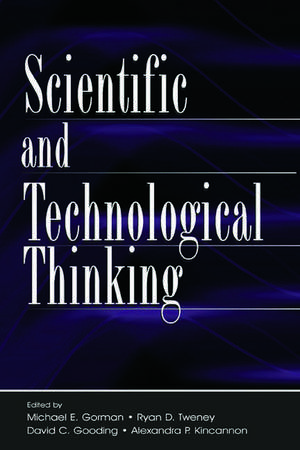Scientific and Technological Thinking
Editat de Michael E. Gorman, Ryan D. Tweney, David C. Gooding, Alexandra P. Kincannonen Limba Engleză Hardback – 6 aug 2004
This book takes the reader out onto the cutting edge of research in scientific and technological thinking. The editors advocate a multiple-method approach; chapters include detailed case studies of contemporary and historical practices, experiments, computational simulations, and innovative theoretical analyses. The editors attempt a provocative synthesis of this work at the end.
In order to achieve true scientific and technological progress, an understanding of the process by which species are transforming the world is needed. This book makes an important step in that direction by leading to breakthroughs in the understanding of discovery and invention.
| Toate formatele și edițiile | Preț | Express |
|---|---|---|
| Paperback (1) | 353.40 lei 43-57 zile | |
| Taylor & Francis – 9 iul 2013 | 353.40 lei 43-57 zile | |
| Hardback (1) | 705.57 lei 43-57 zile | |
| Taylor & Francis – 6 aug 2004 | 705.57 lei 43-57 zile |
Preț: 705.57 lei
Preț vechi: 830.08 lei
-15% Nou
Puncte Express: 1058
Preț estimativ în valută:
135.01€ • 141.34$ • 111.71£
135.01€ • 141.34$ • 111.71£
Carte tipărită la comandă
Livrare economică 07-21 aprilie
Preluare comenzi: 021 569.72.76
Specificații
ISBN-13: 9780805845297
ISBN-10: 0805845291
Pagini: 378
Ilustrații: Illustrations
Dimensiuni: 152 x 229 x 27 mm
Greutate: 0.66 kg
Ediția:New.
Editura: Taylor & Francis
Colecția Psychology Press
Locul publicării:Oxford, United Kingdom
ISBN-10: 0805845291
Pagini: 378
Ilustrații: Illustrations
Dimensiuni: 152 x 229 x 27 mm
Greutate: 0.66 kg
Ediția:New.
Editura: Taylor & Francis
Colecția Psychology Press
Locul publicării:Oxford, United Kingdom
Public țintă
ProfessionalCuprins
Contents: Preface. M.E. Gorman, R.D. Tweney, D.C. Gooding, A.P. Kincannon, Editors' Introduction. N.J. Nersessian, Interpreting Scientific and Engineering Practices: Integrating the Cognitive, Social, and Cultural Dimensions. K.N. Dunbar, J.A. Fugelsang, Casual Thinking in Science: How Scientists and Students Interpret the Unexpected. D. Klahr, A Framework for Cognitive Studies of Science and Technology. S.B. Trickett, C.D. Schunn, J.G. Trafton, Puzzles and Peculiarities: How Scientists Attend to and Process Anomalies During Data Analysis. J. Shrager, On Being and Becoming a Molecular Biologist: Notes From the Diary of an Insane Cell Mechanic. R.D. Tweney, R.P. Mears, C. Spitzmüller, Replicating the Practices of Discovery: Michael Faraday and the Interaction of Gold and Light. P. Thagard, How to Be a Successful Scientist. D.C. Gooding, Seeing the Forest for the Trees: Visualization, Cognition, and Scientific Inference. M.F. Ippolito, Problem Representation in Virginia Woolf's Invention of a Novelistic Form. G. Bradshaw, What's So Hard About Rocket Science? Secrets the Rocket Boys Knew. T.P. Hughes, A Systems Ordered World. M.E. Gorman, Levels of Expertise and Trading Zones: Combining Cognitive and Social Approaches to Technology Studies. B. Allenby, Technology at the Global Scale: Interactive Cognitivism and Earth Systems Engineering and Management. M.E. Gorman, R.D. Tweney, D.C. Gooding, A.P. Kincannon, The Future of Cognitive Studies of Science and Technology.
Recenzii
"...recommend this volume and hope that it indeed opens up greater discussion about scientific and technical thinking and where, how, and why it matters."
—Science Education
—Science Education
Notă biografică
Michael E. Gorman, Ryan D. Tweney, David C. Gooding, Alexandra P. Kincannon
Descriere
This book describes empirically ways to analyze and then to effectually utilize cognitive processes to advance discovery and invention in the sciences. It also explains how to teach these principles to students.














